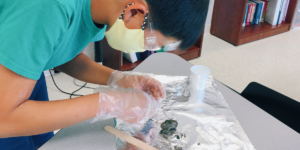Academics
What if a high school has no grades? No Advanced Placement (AP) classes. No International Baccalaureate (IB) program. To most parents in Northern Virginia, this is profoundly unsettling information. They ask, “How will my child get into college?”. The current model is not working for many students, but parents are afraid of the unknown. What they don’t know is that a progressive high school like The Sycamore School (TSS) may be precisely what they need to get into college. The college admissions process has changed dramatically since most parents were in high school. More students than ever are applying to college and acceptance rates have dropped considerably. In 1970, 152,000 students were enrolled in college, by 2000, that number had increased to 382,000 students who were enrolled in college in Virginia. [EducationData.org; July 2021] This is a particular challenge in Northern Virginia, where nine out of the top ten top…
Read More“Is your school accredited?” Since opening The Sycamore School, that has been one of the most common questions. Answering that seemingly simple question was not easy and required some explanation. Schools can only apply for accreditation after they have been open for at least three years; some accreditation organizations require five years. As soon as we could, we started the accreditation process. We had a successful pre-accreditation visit in August of 2019 and had our accreditation visit scheduled for spring of 2020 when COVID hit. Our visit was re-scheduled for the fall of 2020 and then pushed back to April of 2021. It has been a long two years of hurry up and wait, but I can now proudly say, “Yes, The Sycamore School is fully accredited!” What does Accreditation Mean? Accreditation agencies ensure that educational institutions are providing quality education to students and a positive experience for their families.…
Read MoreHow do I fit into my community? How does my community affect my identity? What about my environment shapes my point of view? These are the questions we pondered this past year in the Middle School experience class, Let’s Take a Walk (LTAW). At The Sycamore School, instead of separate core classes, our students engage in transdisciplinary experiences each semester that incorporate content from english, science, history, and math under a unifying theme. For our LTAW experience, our youngest learners did a deep dive across several disciplines to better understand our community, our environment, and where we all fit into these respective communities. At the beginning of the semester, we focused heavily on identity and how we perceive ourselves. We studied the poetry of George Ella Lyon and wrote our poems based on her acclaimed poem, ‘I Am From.’ We used Lyon’s writing as a catalyst for our identity poems,…
Read MoreAt The Sycamore School, we take a different approach to math instruction. As an independent private school, we are unencumbered by arbitrary year-end standardized tests. Students are free to follow their choice of math concepts throughout the year in a manner that makes the most sense to them and a timeline that works for their brain. At TSS, our students learn at their own pace. In a traditional school setting, teachers typically introduce one new math concept per class. The idea is that this pace will be appropriate for the majority of students in the class. The problem is, students don’t all learn at the same rate. Some concepts they might pick up quickly and other concepts, they may need to work with longer. In a traditional classroom, some students understand the concept right away and are bored for the rest of class. Other students struggle with the lesson and…
Read MoreOur education system is getting derailed, and as parents, we are unwittingly becoming part of the problem. Somehow, we have lost what education and school are all about: learning. We want our kids to love learning and thrive in school. However, as a culture, we’ve become obsessed with achievement and accolades. Grades serve as academic cliff notes, becoming an easy and frankly inaccurate measure of how well our students are learning. What grades really measure is how well our students follow the rules. Our kids are smart and have figured out that good grades lead to praise and attention, which become their goal. So, they figure out how to maximize their time to get the best grades. Sadly, learning is not prioritized. Linda Flanagan writes about the pitfalls of grades in her article The Emotional Weight of Being Graded, for Better or Worse by Linda Flanagan, Mindshift 2016. She makes…
Read MoreEcosystems Experience Blog – by Jon McKenney At The Sycamore School, instead of separate core classes, students engage in transdisciplinary experiences each semester that weave together content from english, science, history, and math under a unifying theme. Past themes have included Identity, Civilizations, Motion, and Forensics. This year, our Middle School 2 cohort (6th and 7th graders) is participating in the Ecosystems experience. Some central questions of the experience include How does climate change impact ecosystems? How do humans, animals, and plants all interact? How can I as an individual make a positive impact on my local environment? These are all big questions, ones that professionals can devote years or lifetimes to studying. They are also questions that the Middle School 2 cohort wrestles with on a daily basis here at The Sycamore School. Transdisciplinary Learning At TSS, we like to do things differently. From our mixed cohorts to our…
Read MoreWe strive to do our best as parents and teach our children how to grow up to be self-sufficient adults. We also want them to become kind and generous adults. Good people. I recently read an article titled For Families: 5 Tips for Cultivating Empathy which reminded me that raising kind and generous adults is not an easy task. How do we cultivate empathy in our children? Our children learn from our actions more than our words. They pay attention to what’s important to us, how we spend our time, and how we treat others. If we want to cultivate empathy in our children, we need to model that behavior ourselves. How do we treat others? Not just our friends, co-workers, and family members who we deem to be our peers, but also the many individuals that make up our community, including waiters, cashiers, custodians, solicitors, and mail delivery people?…
Read More










